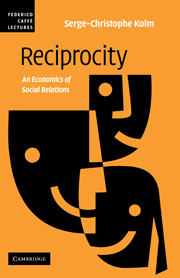Book contents
- Frontmatter
- Contents
- List of illustrations
- Foreword
- Introduction
- Part I Facts and forms
- Part II Motives
- Part III Values and reasons
- 11 The values of reciprocity
- 12 Reciprocal corrections of market failures
- 13 Reciprocity in trust, and intrinsic values
- 14 Normative uses of reciprocity
- 15 The logic of good social relations
- 16 How and why? Understanding and explaining reciprocity
- Part IV The economics of reciprocity
- Bibliography
- Index
13 - Reciprocity in trust, and intrinsic values
Published online by Cambridge University Press: 22 September 2009
- Frontmatter
- Contents
- List of illustrations
- Foreword
- Introduction
- Part I Facts and forms
- Part II Motives
- Part III Values and reasons
- 11 The values of reciprocity
- 12 Reciprocal corrections of market failures
- 13 Reciprocity in trust, and intrinsic values
- 14 Normative uses of reciprocity
- 15 The logic of good social relations
- 16 How and why? Understanding and explaining reciprocity
- Part IV The economics of reciprocity
- Bibliography
- Index
Summary
Reciprocity in trust, relational capital, and efficiency
Conducts and relations of reciprocity are also frequent in the working of most organizations, including firms. They commonly improve this working and are often necessary for it, particularly because of the impossibilities and costs of specific information and checking. They take the form of mutual aid, including in questions of information and advising. This happens between members of the organization, or between the organization as such and its hired employees, in which case it is a particular case of reciprocity within an exchange or market relationship. These reciprocities within organizations can also have all the extended forms: generalized, general and reverse.
These effects of reciprocities as correcting microeconomic deficiencies of markets and improving or making possible the working of organizations are important causes of economic and social efficiency. In particular, impossibilities or costs of contracting or enforcing contracts, and of imposing hierarchical command, and resulting uncertainties about the behaviour of others, are corrected by a family of conducts that are largely supported by their being – in these cases – reciprocal, notably keeping one's promises, hence being trustworthy, and also trusting, along with voluntarily paying one's due and doing one's part. These conducts and attitudes can be at work between individuals, within organizations (including firms) between members or bureaus and between the management and other parts, between organizations or organizations and individuals, for social relations of various types and importance. They are essential factors of economic efficiency and social cohesion.
- Type
- Chapter
- Information
- ReciprocityAn Economics of Social Relations, pp. 185 - 191Publisher: Cambridge University PressPrint publication year: 2008

